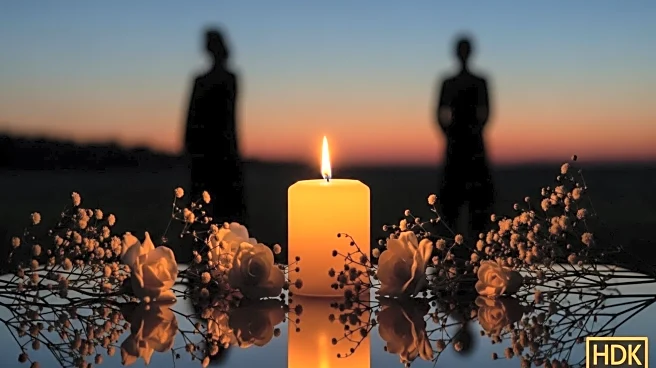What's Happening?
The Israeli government has announced that it will not hold an official state ceremony on October 7 this year, marking the anniversary of Hamas's deadly attacks. Instead, the national day of remembrance will be observed on the Hebrew calendar date, the 24th of Tishrei, which falls on October 16. This decision marks a departure from last year's approach, where ceremonies were held on both the Gregorian and Hebrew dates. On October 16, two state ceremonies will take place at Mount Herzl in Jerusalem to honor fallen soldiers and civilians killed in the attacks. Meanwhile, on October 7, a separate memorial organized by KUMI, a nonprofit led by Yonatan Shamriz, will feature a lineup of Israeli performers volunteering to participate. The event will be broadcast live on television and screened at community gatherings in Israel and abroad.
Why It's Important?
The decision to mark the memorial only on the Hebrew date reflects a shift in how the Israeli government is choosing to commemorate significant national events. This approach may influence public sentiment and the way historical events are remembered in the country. The separate memorial organized by KUMI highlights the role of civil society in preserving the memory of tragic events and supporting affected families. The involvement of prominent Israeli performers underscores the cultural significance of the memorial and its potential to unite communities in remembrance. This development may also impact how future memorials are organized and perceived by the public.
What's Next?
The KUMI-organized memorial on October 7 will proceed with a lineup of volunteer performers, and the event will be broadcast live. The group aims to secure a central location for the ceremony, funded by a successful crowdfunding campaign. The government's decision may prompt discussions on the importance of official versus community-led commemorations. Stakeholders, including families of victims and civil society groups, may continue to advocate for broader recognition of the Gregorian date in future memorials.
Beyond the Headlines
The decision to commemorate the event solely on the Hebrew date may have deeper implications for how national tragedies are integrated into the cultural and historical narrative of Israel. It raises questions about the balance between religious and secular observances in public life. Additionally, the role of nonprofit organizations like KUMI in organizing significant memorials highlights the growing influence of civil society in shaping public memory and discourse.










